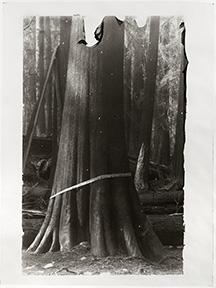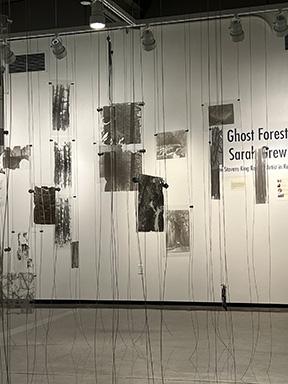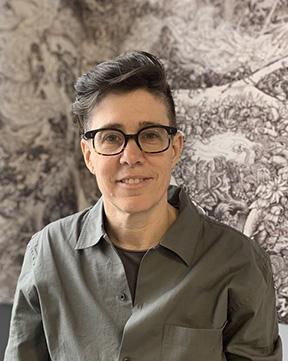
About the Project
“Haunting Ecologies: The Past, Present, and Future of Feminist and Indigenous Approaches to Forest Fire” is a CSWS and UO Environment Initiative partnership. It includes the 2023 Acker-Morgen Memorial Lecture by invited scholar Michelle Murphy, and the panel discussion “Native Ecologies” on Indigenous histories and approaches to fire management, knowledge production, and ecological stewardship. The lecture and panel discussion are presented in conjunction with “Ghost Forest”—an exhibition by Eugene artist Sarah Grew at the LaVerne Krause Gallery, featuring Jon Bellona’s sound installation “Wildfire.”
“Haunting Ecologies” is cosponsored by the CAS Program Grant, Center for Environmental Futures, College of Design, Native American and Indigenous Studies, Just Futures Institute, and the Barbara and Carlisle Moore Chair in English.
Program
- Ghost Forest, an exhibition by Eugene photographer Sarah Grew, featuring Jon Bellona’s sound installation Wildfire. April 24–May 4, 2023, LaVerne Krause Gallery, Lawrence Hall. Open hours Monday–Friday, 9 am–6 pm.
- Native Ecologies, a panel discussion on Indigenous histories and approaches to fire management, knowledge production, and ecological stewardship with moderator Kirby Brown and panelists Kari Marie Norgaard, Joe Scott, and David G. Lewis. 4–6 pm Tuesday, April 25, 2023, 115 Lawrence Hall. Ghost Forest opening reception immediately following in the Lawrence Hall lobby.
- Desire in the Aftermath of Environmental Violence, the 2023 CSWS Acker-Morgen Memorial Lecture with Professor Michelle Murphy (University of Toronto), 4:30–6 pm Tuesday, May 2, 2023,177 Lawrence Hall, followed by a joint reception at the Many Nations Longhouse with the 2023 Climate Change and Indigenous Peoples Lecture: Jen Rose Smith.
Ghost Forest Exhibition
Image
Following the devastating 2020 wildfires in Oregon, Sarah Grew collected black coals from the fires that she then used through extensive research and experimentation, to create carbon prints of recorded images of the forests themselves. Her process and its resulting prints, with their frilled edges and torn emulsion echo the way natural fire cycles can surmount devastation to provide nutrients to the soil, force a pinecone to disperse its seeds, or shape the landscape, in contrast to the extreme intensity and size of the fires that are now common. The photographs show us the beauty being lost to human negligence and the climate crisis. Printed as lantern slides, the forest memory is held captive on sheets of glass accentuating both the fragility of life and our precarious position. Hung at various heights the viewer is invited to move through the Ghost Forest, witnessing a range of natural elements.
The exhibition at the LaVerne Krause Gallery will also include Jon Bellona’s sound installation Wildfire—a 48-foot-long speaker array that plays back a wave of fire sounds at speeds of actual wildfires. An instructor of audio production in the School of Music and Dance, Bellona hopes the installation will allow viewers to embody the devastating spread of wildfires through an auditory experience.
Sarah Grew creates art based in painting and photography, that expands into installation and environmental art and contracts into collage and printmaking. Her work includes a range from public art projects to wall based pieces belonging in private collections nationally and internationally. In researching the concepts that enrich her work she has become a beekeeper, studied native plant habitats, and worked as an Artist-in-Residence for a recycling facility in California. Recently, she was an artist in residence on a science research boat studying the effects of climate change on the plankton food web. Previously, Grew was awarded residencies at Sitka Center for Art and Ecology, Playa Artist Residency, the Djerassi Resident Artist Program, Joshua Tree National Park, the Collegeum Phaenomonologicum in Italy, Brush Creek and the Ucross Foundation. She has also received several support fellowships from The Ford Family Foundation.
Jon Bellona is a sound artist who specializes in digital technologies, and a Career Instructor of Audio Production within the School of Music and Dance at the University of Oregon. His music and media explore environmental sustainability, data-body interactivity, digital musical instruments, site-specific sound, and choreographic composition. Bellona is a co-director of Harmonic Laboratory, an interdisciplinary arts collective focused on art and technology collaborations. His work has been shown in concerts, festivals, and galleries across North America and Europe.
Native Ecologies Panel Discussion
The Native Ecologies panel discussion will precede the Ghost Forest exhibit's opening reception and will include moderator Kirby Brown and panelists Kari Marie Norgaard, David G. Lewis, Joe Scott, and Amada Lang.
Dr. Kari Marie Norgaard is a non-Native Professor of Sociology and Environmental Studies who lives and thinks in Kalapuya lands at University of Oregon. She has also worked as a consultant for the Karuk Tribe on tribal environmental policy since 2003. Over the past fifteen years Dr. Norgaard has published and taught in the areas of environmental sociology, Indigenous environmental justice, gender, and sociology of emotions. She is the author of over three dozen articles and book chapters, Living in Denial: Climate Change, Emotions and Everyday Life (MIT Press, 2011) and a recipient of the Fred Buttel Distinguished Contribution Award, and together with Ron Reed, a Sociology of Emotions Recent Contribution Award. Her latest book Salmon and Acorns Feed Our People: Nature, Colonialism and Social Action was a 2020 finalist for the C.W. Mills Award of the Society for the Study of Social Problems.
David G. Lewis, PhD, is an OSU Assistant Professor of Anthropology and Ethnic Studies & Indigenous Studies. He is a member of the Grand Ronde Tribe, descended from Takelma, Chinook, Molalla, and Santiam Kalapuya peoples. A professional consultant, educator and researcher, he teaches at local universities and colleges and contracts with tribes, local governments and nonprofits. He has experience in archival organization, museum development, exhibit curation, traditional cultural property nomination, tribal ethnohistoric research, tribal maps, traditional ecological knowledge, and presentations to large and small gatherings. David lives at Chemeketa, where he researches and writes histories of the western Oregon tribes, published on his blog, The Quartux Journal: ndnhistoryresearch.com.
Joe Scott is a member of the Confederated Tribes of Siletz Indians, a descendent of the Rogue River Tribes of Southern Oregon. He currently lives and studies on Kalapuya Illahee as Curriculum Director for the Traditional Ecological Inquiry Program, partnering with regional land stewards to serve tribal families to support environmental stewardship, promote food sovereignty, and explore traditional ways of knowing through the exploration of Indigenous ecological science. He is a traditional ecologist and cultural fire practitioner, and a lifelong Tribal teacher and learner.
Amada Lang is a Karuk, Wiyot, and Konomihu Shasta Native. She is the Klamath Basin coordinator for Rios to Rivers, providing outdoor adventure education through a traditional ecological knolwedge (TEK) perspective, and an intern for Save the California Salmon. Her educational work with Native youth involves TEK, policy work regarding our rivers, and supporting youth water protectors. In 2022, she was selected to be a part of the WTREX program held in Orleans, California that was only for Indigenous woman, where was able to gather knowledge of cultural burning and prescribed fire. She has a bachelor’s degree in recreation administration from Humboldt State University and a graduate degree from the environment and community social science program at Cal Poly Humboldt.
Dr. Kirby Brown is an Associate Professor of Native American and Indigenous literary and cultural production in the Department of English and the Director of Native American and Indigenous Studies at the University of Oregon. He is an enrolled citizen of the Cherokee Nation. His book, Stoking the Fire: Nationhood in Cherokee Writing, 1907-1970 (University of Oklahoma Press, 2018), examines how four Cherokee writers variously remembered, imagined and enacted Cherokee nationhood in the period between Oklahoma statehood in 1907 and tribal reorganization in the early 1970s. It was awarded an Andrew W. Mellon grant in 2018, earned the Thomas J. Lyons Award for best monograph in Western American Literary Studies by the Western Literature Association in 2019, and received Honorable Mention for Studies in Native American Literatures, Cultures, and Languages by the Modern Language Association in 2020.
Michelle Murphy: Desire in the Aftermath of Environmental Violence
The 2023 Acker-Morgen Lecture will be delivered as a closing event to the Ghost Forest exhibition.
How might we start with desire, rather than damage, in the aftermath of intensive environmental violence? Ongoing environmental violence not only disrupts life changes, but chemical exposures can also perturb the very bodily development of human and non-human sexed being. This talk weaves Indigenous feminist methods and trans-ecology concerns to look for ways of building queer anti- colonial futures and frames for sexed being in the wake of ongoing environmental harm.
Image
M Murphy (they/them) is a Professor of History and Women and Gender Studies at the University of Toronto, where they hold a Tier 1 Canada Research Chair in Science & Technology Studies and Environmental Data Justice at the University of Toronto. Their research is concerned with feminist and anticolonial approaches to environmental justice, reproduction, Indigenous science and technology studies, infrastructures and data studies; transecologies. They are Co-Director of the Technoscience Research Unit, which is a home for social justice approaches to science and technology studies, as well as the Co- Director of an Indigenous Environmental Data Justice Lab. Murphy is the author of The Economization of Life (2017), Seizing the Means of Reproduction (2012), and Sick Building Syndrome and the Politics of Uncertainty (2006), all with Duke University Press. Their work has twice been awarded the Fleck Prize from the Society for the Social Studies of Science, and they are a Fellow of the Royal Society of Canada. Murphy's current research focuses on the relationships between chemical pollution, colonialism, and technoscience on the lower Great Lakes. They are Métis from Winnipeg, Manitoba, a citizen of the Red River Métis, as well as French Canadian.
About the Acker-Morgen Memorial Lecture Series
This annual lecture series commemorates the legacies of CSWS directors Joan Acker and Sandra Morgen, both of whom died in 2016.
A pathbreaking feminist researcher, Joan Acker was a professor of sociology at the University of Oregon, where she taught for nearly three decades. In 1973, she helped establish what is now the Center for the Study of Women in Society, which she directed until 1986. Her books on gender and class include Doing Comparable Worth: Gender, Class, and Pay Equity; Class Questions: Feminist Answers; and Stretched Thin: Poor Families, Welfare Work, and Welfare Reform (coathored with Sandra Morgen and Jill Weigt). Her many honors and awards included sociology’s top award, the American Sociological Association Career of Distinguished Scholarship Award.
A pioneer in feminist anthropology, Sandra Morgen began teaching at UO in 1991 as an associate professor of sociology, moving to the anthropology department in 2002. She served as director of the Center for the Study of Women in Society from 1991-2006 and later held leadership roles in the graduate school before returning to teach undergraduate- and graduate-level courses. In addition to coauthoring Stretched Thin, Morgen also published Into Our Own Hands: The Women’s Health Movement in the U.S. 1969-1990, winner of the Basker Prize from the Society for Medical Anthropology in 2004. She helped found the Society for North American Anthropology, which honored her in 2003 for outstanding contributions to anthropology in the U.S.

